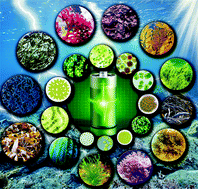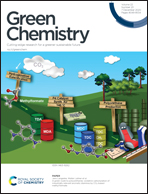Algae-based electrochemical energy storage devices
Abstract
Biomass materials are abundant, low-cost, non-hazardous, disposable, environmentally friendly, and renewable organic materials that are considered an appropriate solution for environmental contamination. Algae are renewable living organisms that grow throughout the world. More than one million algal species grow around the world. Algae have several important applications in materials science. One of the important applications of algae is preparing electrochemical energy storage (EES) devices. EES-devices are considered as an appropriate solution for industries to reduce environmental pollution. EES-device preparation from renewable organic materials is a significant issue which has been extensively examined by scientists in recent years. Tremendous effort has been applied to prepare EES-devices from algae as a renewable resource. The four main parts of EES-devices are the electrode, binder, electrolyte, and membrane, and can be prepared from algae. The purpose of this review is to provide an overview of the progress in the preparation of EES-devices from algae, examine algae-EES electrochemical properties in the last few decades, and also present an appropriate perspective for future research on algae-based EES-devices.



 Please wait while we load your content...
Please wait while we load your content...